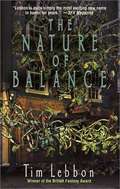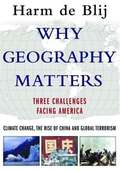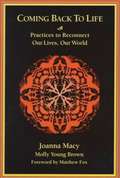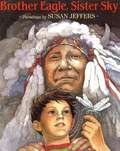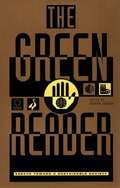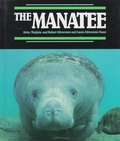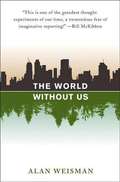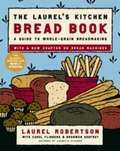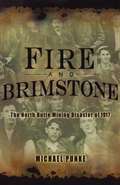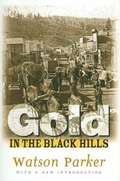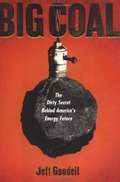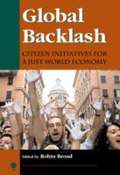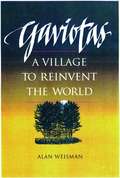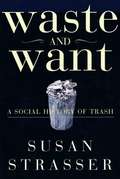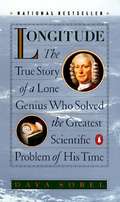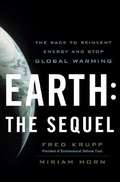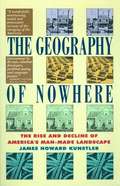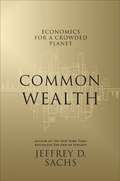- Table View
- List View
The Nature of Balance
by Tim LebbonOne morning, the world does not wake up. People lie dead in their beds, killed by their own nightmares. They're lucky. For the few remaining survivors, the new world is a confusing, terrifying place.
Why Geography Matters: Climate Change, The Rise of China, and Global Terrorism
by Harm De BlijDe Blij, a geography professor and former National Geographic Society editor, seeks to rekindle interest in his discipline with this unfocused survey of the world and its discontents. Struggling to describe his notoriously hard-to-define field, de Blij suggests that geographers "look at things spatially" as opposed to "temporally" or "structurally," the "things" being a grab bag of phenomena, including climate, topography, demographics, national boundaries and the distribution of languages, religions, energy deposits and pipelines.
Coming Back to Life: Practices to Reconnect Our Lives, Our World
by Joanna R. Macy Molly Young BrownMany of us feel called to respond to the ecological destruction of our planet, yet we feel overwhelmed, immobilized, and unable to deal realistically with the threats to life on Earth. Noted spiritual and environmental thinkers Joanna Macy and Molly Young Brown contend that this crippling response to world crisis is a psychological defense mechanism that has been endemic since the years of the Cold War arms race, when we had to adapt within a single generation to the horrific possibility of nuclear holocaust. Since its publication in 1983, Joanna Macy's book, Despair and Personal Power in the Nuclear Age has sold nearly 30,000 copies and has been the primary resource for groups of men and women confronting the challenging realities of our time without succumbing to paralysis or panic. Coming Back to Life provides a much needed update and expansion of this pioneering work. At the interface between spiritual breakthrough and social action, Coming Back to Life is eloquent and compelling as well as being an inspiring and practical guide. The first third of the book discusses with extraordinary insight the angst of our era, and the pain, fear, guilt and inaction it has engendered; it then points forward to the way out of apathy, tio "the work that reconnects". The rest of the book offers both personal counsel and easy-to-use methods for working with groups in a number of ways to profoundly affect peoples' outlook and ability to act in the world.
Brother Eagle, Sister Sky: A Message from Chief Seattle
by Chief Seattle Susan JeffersFrom the Book jacket: How can you buy the sky? How can you own the rain and the wind? So began the moving words attributed to a great American Indian chief over one hundred years ago. They are words that eloquently and poetically captured the central belief of Native Americans: that this earth and every creature on it is sacred. It is these words and this belief that have inspired what has been truly a labor of love for Susan Jeffers; her most extraordinary paintings illuminate the words and world vision possessed by Native Americans. Brother Eagle, Sister Sky will haunt all who see it with its portrayal of what has been lost in our world, and is an important message to people young and old to care for and preserve the environment. CHIEF SEATTLE lived from approximately 1790 to 1866, in the Pacific Northwest region of what is now the United States. He was a chief of the Suquamish and the Duwamish Indians and was present at treaty negotiations that took place with the dominant white settlers in the 1850s. It is at one of these negotiations that Chief Seattle delivered a speech in his native tongue, a speech which has since- in a variety of forms-served as the basis of ecological movements around the world and from which Brother Eagle, Sister Sky is drawn. Susan Jeffers is internationally acclaimed for her exquisite paintings, and the illustrator of numerous picture books for Dial-all of which brilliantly portray nature. Ms. Jeffers' paintings are beautifully described.
Alligator and Crocodile Rescue
by Trish SnyderFrom the Book jacket: Loathed for their dining habits and adored for their skins, alligators and crocodiles were hunted almost to extinction. But thanks to some creative conservation efforts, their status has improved dramatically. Even so, they are still at risk: eight species remain on the endangered list, and some hover on the edge of extinction. In Alligator and Crocodile Rescue, you'll meet people from around the world who are helping to ensure a future for these living links to dinosaurs. Trish Snyder has been an editor at Today's Parent, Chatelaine and House and Home. An award-winning writer, her articles have appeared in Toronto Life, Canadian Business, MoneySense and Glow. Alligator and Crocodile Rescue is her first book.
Bird Ambulance
by Arline ThomasStories from a woman in New York who began her own shelter for injured wild birds. She talks about assisting falcons, hawks, pigeons and owls, but there is also a chapter on other animals--like squirrels--who come into her life. A fantastic read with helpful information on what to feed injured birds and mammals.
The Green Reader: Essays Toward a Sustainable Society
by Andrew DobsonThe Green Reader collects key source documents of today's most important social/scientific/philosophical movement-the Green movement.
The Magic School Bus Inside A Hurricane
by Joanna ColeMs. Frizzle is a grade school teacher who takes her class on fantastic field trips using her magic, metamorphosing school bus. In this installment, the class is heading for a visit at a weather forecasting center when they find themselves in the middle of a hurricane. Learning about weather and hurricanes ensues.
The Manatee (Endangered in America)
by Alvin Silverstein Virginia Silverstein Robert Silverstein Laura Silverstein NunnFrom the Book Jacket: ENDANGERED IN AMERICA More than 300 kinds of North American anil endangered or threatened - at risk of dyini are taking action to help them, sometimes success. These books present the stories oi animals, and of the efforts to save thei The Spotted Owl The Red Wolf The Black-Footed Ferret The Peregrine Falcon The Sea Otter The Manatee Other books in this series are available from Bookshare.
The World Without Us
by Alan WeismanWhat would happen to the Earth if all humans vanished one day? What would collapse first? Which items would be immortalized as fossils? How much capacity for self-healing does the Earth have?
The California Condor
by Alvin Silverstein Virginia Silverstein Laura Silverstein NunnDescribes the physical characteristics and behavior of the California condor, its decline in numbers due to human population growth and activities, and the efforts being made to maintain its population.
Stars, Moon, and Clouds (Glow in the Dark)
by Eugene Bradley CocoEthan decides to take some stars from the sky and keep them in his room. He thinks that will make him happy. But what will make the stars happy?
The Laurel's Kitchen Bread Book: A Guide to Whole-Grain Breadmaking
by Carol Lee Flinders Laurel Robertson Bronwen GodfreyFrom the simplest white bread, to the most complicated holiday bread, the recipes is probably in this book. Want to try your hand at making sourdough started? Looking for something to do with spelt? Are you longing for the tastes of Grandma's kitchen? This is a marvelous reference as well as a useful cookbook, and there is plenty for the armchair cook, too.
Fire and Brimstone
by Michael PunkeThere is a sign that appears to point persistently to a terrible explosion underground. -HOROSCOPE PRINTED IN THE ANACONDA STANDARD, JUNE 5, 1917
Gold in The Black Hills
by Watson Parker(back cover) Gold in the Black Hills brings to life the days "when adventure stood by a man's elbow, fortune lay at the tip of his shovel, and it was good to be alive." In this classic account of the Black Hills gold rush of 1874-1879, Watson Parker weaves a delightful and authoritative guide out of the chaotic and complex history of early settlement. Gold in the Black Hills is an essential resource for anyone who wants a unified picture of a thrilling episode in American history. A skillful storyteller, watson PARKER taught history at the University of Wisconsin at Oshkosh, where he was awarded a Rosebush Professorship for excellence in teaching, professional achievement, and public service. Retired since 1986, he again lives in the Black Hills where he grew up and continues to research the history of the region.
Big Coal: The Dirty Secret Behind America's Energy Future
by Jeff GoodellPresident Bush has said coal is America's "economic destiny." Despite a century-long legacy that has claimed millions of lives and ravaged the environment, why has coal become hot again? Few of us realize that coal already supplies more than half the energy needed to power our iPods, laptops, lightsanything we use that consumes electricity. Every time we flip on a switch, we burn a lump of coal. Our desire to find a homegrown alternative to Mideast oil, the rising cost of oil and natural gas, and the fossil fuelfriendly mood in Washington will soon push our coal consumption through the roof. Because we have failed to develop alternative energy sources, coal has become the default fuel for the twenty-first century. In the tradition of Rachel Carson and Eric Schlosser, the veteran journalist Jeff Goodell examines the faulty assumptions underlying coal's revival and shatters the myth of cheap coal energy. In a compelling blend of hard-hitting investigative reporting, history, and business analysis, Big Coal illuminates the stark economic imperatives America faces and the collusion of business and politics that has already set us on the dangerous course. Filled with troubling environmental and health revelations, Big Coal shows us that our shiny white iPod economy is propped up by dirty black rocks.
Global Backlash: Citizen Initiatives for a Just World Economy
by Robin BroadBook aims to get inside the backlash to some of its visions, proposals, and debates. Introduces readers to different parts of the movement by presenting what they are trying to do to change the way the world economy works.
Emu
by Pauline ReillyTells the story of the Emu, flightless bird of Australia, as he raises his family, and travels, and finds a new mate for the next year.
Gaviotas: A Village to Reinvent the World
by Alan WeismanThe story of Gaviotas, a village in a remote area of Colombia once thought uninhabitable, and the simple, affordable technology that was developed there and is now in use throughout Colombia.
Waste and Want: A Social History of Trash
by Susan Strasser(back of book) Susan Strasser's pathbreaking histories of housework and the rise of the mass market have become classics in the literature of consumer culture. Here she turns to an essential but neglected part of that culture - the trash it produces - and finds in it an unexpected wealth of meaning. Before the twentieth century, streets and bodies stank, but trash was nearly nonexistent. With goods and money scarce, everything possible was reused. Strasser paints a vivid picture of an America where scavenger pigs roamed the streets, "swill children" collected kitchen garbage, and itinerant peddlers traded manufactured goods for rags and bones. In the last hundred years, that way of life has been replaced by mass consumption, disposable goods, and waste on a previously unimaginable scale. Strasser charts the triumph of "disposable" goods - paper cups, toilet paper, packaged food - those signature products of modern life. And she shows how Americans became hooked on convenience, fashion, and constant technological change - as the mountains of garbage rose higher and higher. Lively and colorful, Waste and Want recaptures a hidden part of our social history, vividly illustrating that what counts as trash depends on who's counting, and that what we throw away defines us as much as what we keep.
Longitude: The True Story of a Lone Genius Who Solved the Greatest Scientific Problem of His Time
by Dava SobelBiography of John Harrison, who solved the problem of figuring out what a ship's latitude was, by figuring out how a ship could keep precise time at sea.
Earth: The Race to Reinvent Energy and Stop Global Warming
by Fred Krupp Miriam HornHOW TO HARNESS THE GREAT FORCES OF CAPITALISM TO SAVE THE WORLD FROM CATASTROPHE. The forecasts are grim and time is running out, but that's not the end of the story. In this book, Fred Krupp, longtime president of Environmental Defense Fund, brings a stirring and hopeful call to arms: We can solve global warming. And in doing so, we will build the new industries, jobs, and fortunes of the twenty-first century. In these pages the reader will encounter the bold innovators and investors who are reinventing energy and the ways we use it. Among them: a frontier impresario who keeps his ice hotel frozen all summer long with the energy of hot springs; a utility engineer who feeds smokestack gases from coal-fired plants to voracious algae, then turns them into fuel; and a tribe of Native Americans, for two thousand years fishermen in the roughest Pacific waters, who are now harvesting the fierce power of the waves themselves. These entrepreneurs are poised to remake the world's biggest business and save the planet-if America's political leaders give them a fair chance to compete.
The Cooling
by Lowell PonteAre we entering a new ice age? Many scientists think so. Many others say that the climate is becoming unstable, and that this instability is a critical threat to world food production. Earth's climate has been cooling rapidly for the past three decades, and this has already caused drought and famine in major areas of the world. In the time it takes you to read this book, at least a thousand people will have starved to death because of the impact climatic instability already has had on food production. And The Cooling has barely begun. Few questions are as urgent today as those concerning climate change and what may be done about it. Dr. Cesare Emiliani, a "paleoclimatologist" at the University of Miami, says: "Is Earth's climate changing? Should governments try to modify climate? In dealing with these controversial issues, Lowell Ponte has written a remarkably thorough, far-ranging, balanced, and scientifically accurate book-the best popular book I have read on both these questions. I recommend THE COOLING to anyone who likes to think, and who cares about the planet we share."
The Geography of Nowhere: The Rise and Decline of America's Man-Made Landscape
by James Howard KunstlerThis book traces the development of modern American car culture and the architecture and social life of cities and suburbs that developed around it.
Common Wealth: Economics for a Crowded Planet
by Jeffrey D. SachsA set of practical solutions based on a new economic paradigm for our crowded planet, from an assessment of the environmental degradation, rapid population growth, and extreme poverty that threaten global peace and prosperity
